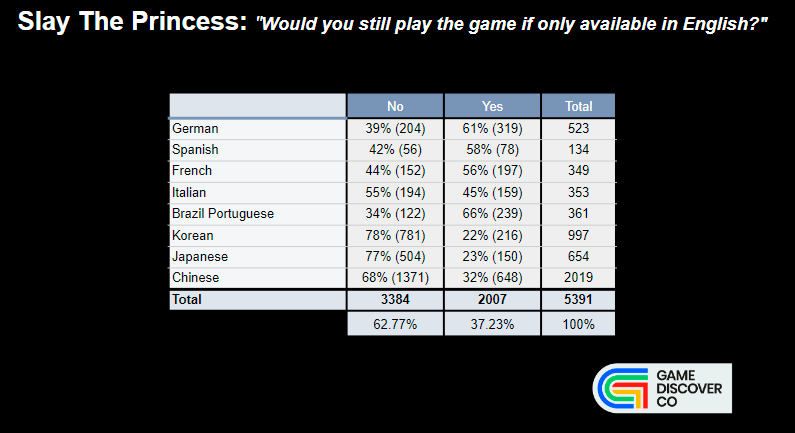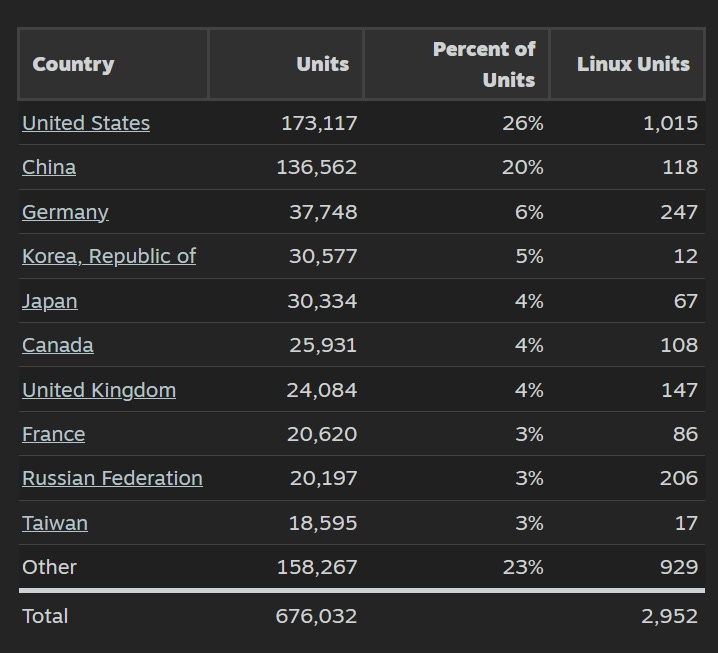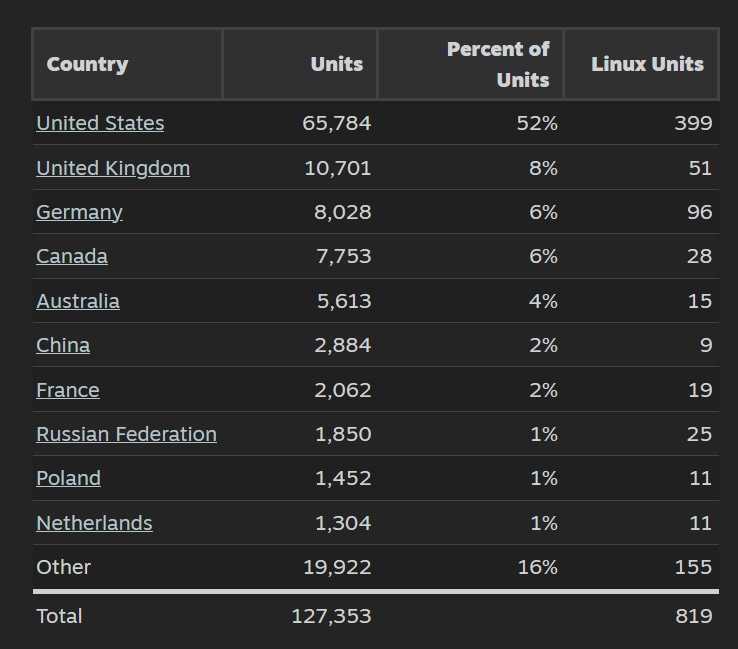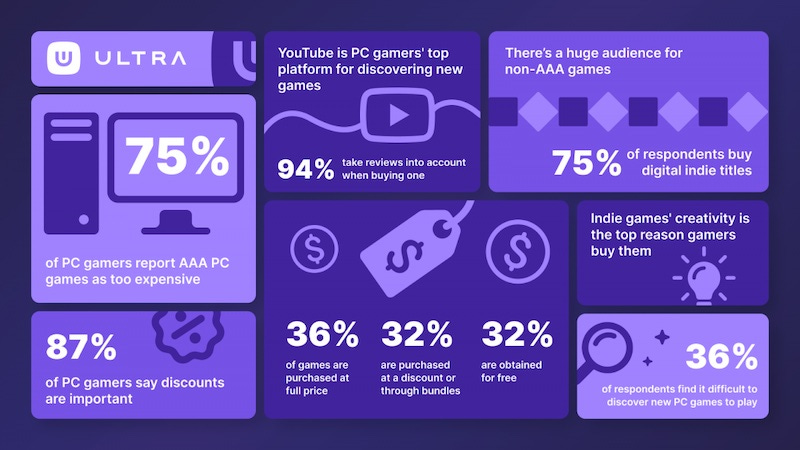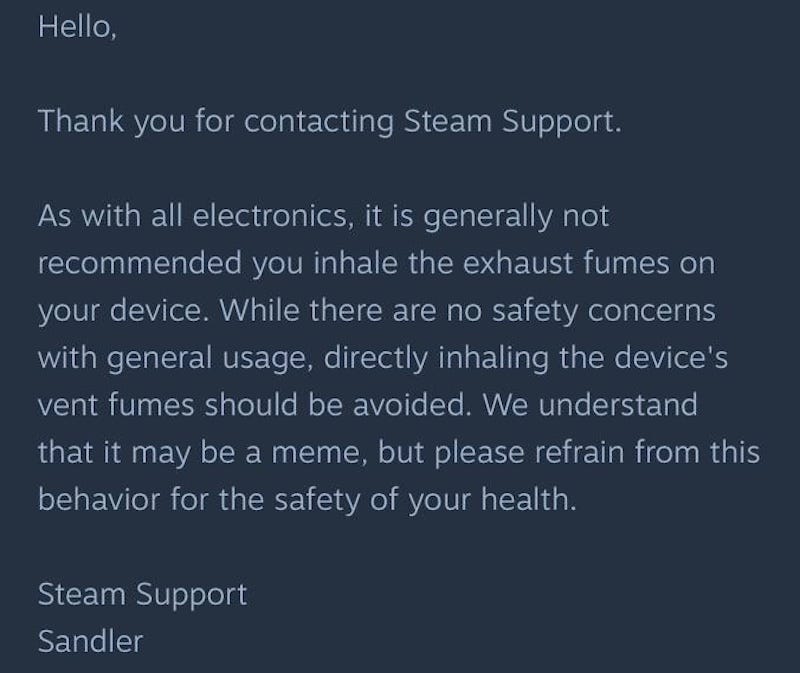How localization affects game discovery: real data!
Also: an interesting survey on PC gamers, and lots of news.
[The GameDiscoverCo game discovery newsletter is written by ‘how people find your game’ expert & company founder Simon Carless, and is a regular look at how people discover and buy video games in the 2020s.]
Hey folks - welcome to what looks should be the pen-penultimate (!) GameDiscoverCo newsletter of the year. (To go: Friday 15th’s game trend analysis for Plus subs, and next Monday 18th’s newsletter, which will be a special ‘Top new games of 2023’ analysis!)
In the meantime, let’s get going with a look at something we think is underdiscussed, especially for small and medium indie devs: the importance of having wider localization in place for your game. (And we come with data!)
[HEADS UP: you can support GameDiscoverCo by subscribing to GDCo Plus now. You get full access to a super-detailed Steam data cache for unreleased & released games, weekly PC/console sales research, Discord access, six detailed game discovery eBooks - & lots more. ]
How localization affects game discovery: data!
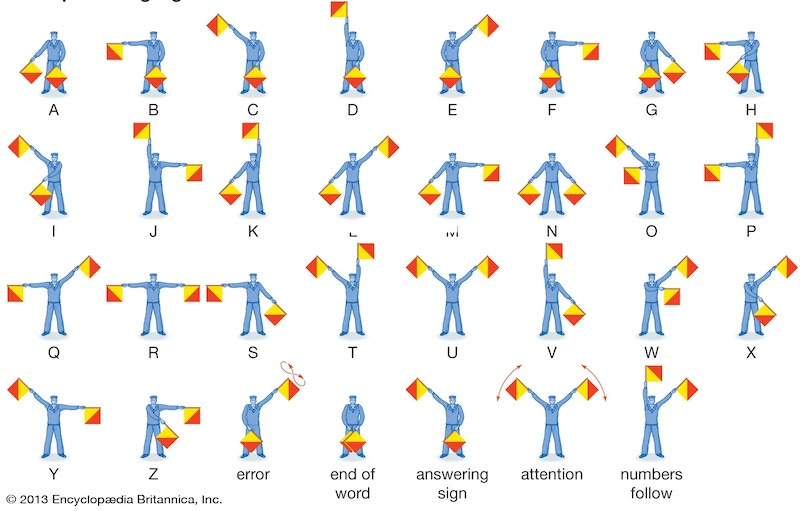
Firstly, I think we all recognize: games are a global phenomenon. And having your PC/console game available in many languages really helps sales, especially on the hyper-global Steam platform - even if you don’t do local marketing in that territory.
But one thing we think is underdiscussed: your game’s discoverability is affected by having specific languages (Chinese, etc!) selected (the ‘interface’ tickbox on the right side of the Steam page!) from the first day your game’s page is available on Steam.
Here’s our view and understanding on this (correct us if wrong!):
If you don’t select a language tickbox for an unreleased or released game, then in that country’s localized Steam store, discovery options may be more limited. (You won’t find the game as much via tag browsing, Discovery Queue, etc.)
However, many players in foreign countries may end up picking English as a secondary language on Steam, so they can more fully see all games available. So perhaps this particular effect is more muted than you would naturally think.
Nonetheless, we think ticking target languages early is more important than you would think: if people want to play the game and see it’s not in their language, they may not wishlist. (But don’t promise a language & then remove it later!)
One important note: if you’re not sure it’s economical to localize, and you have a very large game, it’s possible to localize the Steam page without having the language box ticked, and ask questions to gauge interest. BTW, Steam page localization operates independently of that ‘what the game will have’ tickbox.
And now, for the data! The folks who created Slay The Princess (a very text-heavy visual novel, which we covered in-depth recently) surveyed their pre-release audience - using localized Steam page text and a survey link - to find out who would still play the game if only in English. And here are the results, shared with GameDiscoverCo:
One important thing to remember for this game - it’s entirely played via reading text, about 150,000 words worth! (Also, you need to have found the Slay The Princess page somehow and already be a ‘fan’.) So it presents a different profile from many games.
But this data is still great, beause it shows you that countries like Brazil (66% yes!) and Germany (61% yes!) are more likely to be able to deal with dense English text than Korea (22% yes!), Japan (23% yes!) and China (32% yes!) And you see the message in general: you can increase the sales of this game a lot with the correct localization.
Similar genre games, localized and non-localized?
So, we were talking about this result with Tim Bender, CEO of strategy game publisher Hooded Horse, and he said something we agree with: Slay The Princess’ numbers are coming from ‘core fans’, so may understate the upside of localizing.
So what are the real numbers? Tim kindly provided us with real regional data for two games. Firstly - from November 22nd, just before its recent, very successful 1.0 launch, here’s the data for fantasy city-builder Against The Storm, available in 17 languages (!)
What’s notable here - as you’ll see imminently - is that Asian countries (China, Japan, Korea, Taiwan) account for at least 32% of sales (Frontloaded to China, sure, but still.)
As a contrast point, we can look at the numbers for “simulation-heavy tactical space game” Nebulous: Fleet Command, which is in Early Access, and currently available only in English for technical reasons. (Localizations coming in due course!)
Tim notes: “What makes Nebulous an interesting comparison… is that there's not a lack of awareness in those regions. There is a fan translation into Chinese, for example, and Japanese streamer interest.” But still, we can see the current regional split for the game:
So, despite selling very well (>125k units and counting), you can see only one Asian country - China, at 2% - in the Top 10 languages for Nebulous. No doubt this is partly due to lack of visibility on Asian versions of Steam - but wow, that’s a giant difference.
And it does indeed imply that you lose way more than 68% of your Chinese players by not doing a Chinese translation of your game. (In fact, it may be 90% or more for many games?) So that’s something to seriously consider. (Thanks to Tim for data!)
Conclusion: what languages should you aim for?
Finally, let’s get down to brass tacks. What are the optimum languages for a small or medium PC game? Let’s take a clear example and try to interpret it.
We were talking about the Brace Yourself Games-published roguelike deckbuilder Cobalt Core in our Discord. Its languages are: “English, French, German, Spanish - Spain, Japanese, Korean, Portuguese - Brazil, Russian, Simplified Chinese, Traditional Chinese.”
For us, that’s pretty much perfect, even for smaller indie games. We note there’s no Italian. This tends to be the one EFIGS country that sometimes gets left out, but could be re-included. And Traditional Chinese maybe isn’t vital, if you have Simplified.
But in general, this is what we think most ‘serious’ games on Steam should be aiming for. If you’re a tiny dev, maybe you can find inexpensive translation collectives or even use community members to help localize. But language really helps discovery & reach - more than many people, hanging out in their own language bubble, realize.
Survey: what do PC gamers think of the market?
So, ahead of its full release in January, blockchain-centric PC digital game store (!) Ultra revealed select data from its survey with Atomik Research of 2,000+ PC gamers from the U.S. and the UK.
We found this actual player data to be ‘pretty good, actually’ - there’s select excerpts on Medium and more info via a press release. So heck, we’re just going to paste in some press release highlights, since it’s a) good b) we don’t have the full data set:
Purchasing power: “75% of PC gamers feel AAA PC games are too expensive, with 87% saying discounts are important in their purchasing decisions. Therefore, only 36% of digital PC games are purchased at full price, while 32% are purchased at a discount or through bundles, and 32% are obtained for free. Possibly showing the shifting business model of gaming, 68% of respondents say they buy in-game content such as battle passes.”
Store Wars: “Steam is unsurprisingly the PC games store that’s most familiar with gamers, followed by Epic Games Store. The best-known challenger stores are GOG (15% awareness) and Humble Store (13%), and resellers such as GamesPlanet (19%) and CDKeys and G2A (both 13%).”
Discoverability: “36% of respondents find it difficult to discover new PC games to play. Gamers are most likely to discover games they hadn’t heard of before on YouTube (38%). The next most influential channels are word of mouth (34%) and Steam promotions (18%). Twitch (12%) is significantly more influential than Kick (2%).”
Reviews: “These remain influential, with only 6% of respondents not taking them into account. Customer reviews are most influential (53%), followed by word of mouth (49%). 31% of PC gamers are influenced by reviews from media outlets.”
Our 2c? Certainly, if you believe that players are being trained by discounting to believe that $60 games are ‘too expensive’, these findings are fuel on that fire. As for what we can do about that? No eye deer.
And we’re also curious to hear the relative familiarity scores for Steam and Epic Games Store, since they weren’t included here. So… roll on January’s full data, so we can find out, huh?
The game discovery news round-up…
And we’re finishing up with a comprehensive look at some of the game discovery and platform news out there, accompanied by the bonkers custom E3-timed custom Cirque Du Soleil show to unveil Xbox’s Kinect, in loving tribute to our first story:
In case you missed it, June’s E3 trade & public game event in Los Angeles is permanently discontinued, with the ESA’s head telling the Washington Post: “Companies now have access to consumers and to business relations through a variety of means, including their own individual showcases.” Looks like the ESA is back to being ‘a Washington DC government lobbying org’ f’real, then?
Here’s a big deal: a jury found that Google’s Android app store monopoly violates antitrust law, and anti-monopolist Matt Stoller says that ‘the breakup of Big Tech begins’ here, though we suspect lots of appeals vs. Epic’s lawsuit will happen, and the practical effect is still murky. Also: here’s 20 things we learned from the Epic vs. Google trial.
November’s U.S. physical (and some digital!) video game sales? Circana’s Mat Piscatella has the rundown, and $ fell 7% YoY to $5.9 billion, with a 24% decline in hardware spend, partly due to cheaper consoles, but also volume. His reaction: “Current gen hardware each down >20% in units despite discounting makes December even more critical… market likely to finish below our previous +3% 2023 forecast.”
Netflix has teased its 2024 game plans - “by year’s end, we’ll have 86 games available… with nearly 90 more games in development” - both in a blog post and in an interview with Axios. Interesting bonus quote: “I think a lot of tech companies say they're getting into an area, put out an MVP… and then the entire fate of that initiative rides on whatever heat that MVP generates.” But Netflix says it’s thinking 5-10 years ahead on games - it’s in for the long haul.
GameDiscoverCo’s very own front-end coder/data raccoon Avi Duda did a presentation on Steam best practices at Game Developers Sessions in Prague the other day, and here’s the slides - you too can: ‘Learn about various Steam features… Use Steam for your advantage.. Recognize similar opportunities on other platforms.”
What’s up in UK retail/digital in November? According to new GSD data, 4.55 million video games (that they could track!) were sold, down 3%. And notably re: the newest Call Of Duty: “the first three weeks of sales for Modern Warfare 3 are just under 38% lower compared with last year's Modern Warfare 2.” Also: Black Friday week had a big 22% YoY $ jump in the UK, thanks to better PS5 availability.
Xbox things: the company has officially discounted Xbox Series X to $399 in the U.S. - ‘while supplies last’ - to juice holiday sales; Xbox cloud streaming is rolling out - in ‘big VR TV screen’ form - on the Meta Quest; Xbox’s CFO mentioned free, cloud streamed & ad-supported Game Pass tiers at that recent financial conference. (But treat it more as a CFO thought experiment than ‘a thing’!)
Have you seen some of those sketchy ‘submit your claim against Steam to get $?’ social media ads? Well, Valve is proactively going after them: “Valve alleges [.PDF] that a small law firm, Zaiger, is attempting to ‘extort’ a settlement by threatening to bring arbitration cases alleging antitrust violations on behalf of more than 50,000 customers of Valve’s game distribution platform Steam.” Popcorn.gif here, folks.
Mobile things: November’s top-grossing F2P mobile games are led by Honor Of Kings, Monopoly Go & Genshin Impact, top-downloaded by Roblox, Real Car Driving (!) & Subway Surfers; lots of talk about web stores and ‘going round’ app stores for payment, and how the EU’s Digital Markets Act might help you do it.
Two corrections from Monday’s Game Awards newsletter: firstly, we omitted Sharkmob’s extraction shooter Exoborne from our charts - it’s now added. (It made the #9 position on our ‘Steam follower increase’ chart.) And secondly, that new Dragon Ball Z fighter is the first Dragon Ball ‘Budokai Tenkaichi’ fighting game in 15+ years, not the first overall DBZ fighter in that timeframe, heh.
Finally, look, we’ll just quote Kotaku here: “Since the release of the [Steam Deck], many owners have reported that they can’t stop sniffing the fumes that waft out… during play. It’s become a bit of a meme among Steam Deck owners, with folks often posting online how much they enjoy the distinctive aroma.”
Somebody asked Steam support about this, and yes, they have a response. Feels like it’s Nintendo Switch cartridge licking all over again, right?
[We’re GameDiscoverCo, an agency based around one simple issue: how do players find, buy and enjoy your PC or console game? We run the newsletter you’re reading, and provide consulting services for publishers, funds, and other smart game industry folks.]

